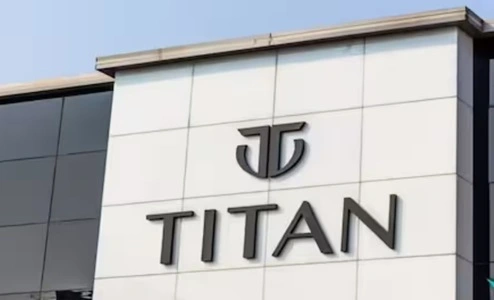Titan Company Limited, a subsidiary of the Tata Group, is one of India’s largest and most successful lifestyle and jewellery companies. Since its inception in 1984, Titan has grown from a single-brand watchmaker to a diversified lifestyle brand with interests in watches, jewellery, eyewear, fragrances, and accessories. With iconic brands like Tanishq in jewellery, Titan and Fastrack in watches, and Titan EyePlus in eyewear, the company has established itself as a trusted household name across India. However, in an increasingly competitive and evolving retail landscape, Titan faces both opportunities and challenges. This SWOT (Strengths, Weaknesses, Opportunities, Threats) analysis explores Titan’s current market position and future outlook.

Strengths
1. Strong Brand Portfolio and Market Leadership:
Titan’s portfolio of trusted brands, including Titan, Tanishq, Fastrack, and Titan EyePlus, provides it with a competitive edge in multiple lifestyle segments. Each brand has a distinct identity and caters to a unique customer demographic, from premium jewellery and watches to fashionable accessories for younger consumers. Titan’s strong brand equity and reputation for quality, design, and trust have made it a market leader in jewellery and watches in India.
2. Extensive Distribution Network and Omnichannel Presence:
Titan’s vast retail network, with over 2,000 stores across India, is one of its biggest strengths. Its presence spans urban centers as well as Tier 2 and Tier 3 cities, allowing the company to serve a wide customer base. Additionally, Titan’s investment in e-commerce and its omnichannel strategy, where online and offline channels work in synergy, enhances customer convenience and brand accessibility, particularly among younger, tech-savvy consumers.
3. Focus on Quality and Customer Trust:
As a Tata Group company, Titan has built a strong reputation for quality, trust, and ethical business practices. Titan’s emphasis on transparency, especially in jewellery, has helped it gain a loyal customer base in an industry often plagued by issues of trust and authenticity. Titan’s “Karigar Centres” (artisan centers) have also contributed to its commitment to craftsmanship, adding authenticity to its product range, especially in Tanishq’s jewellery.
4. Strong Financial Performance and Cash Flow:
Titan has consistently demonstrated robust financial performance, with a strong balance sheet, cash flow, and revenue growth. The company’s diversified portfolio and effective cost management strategies have helped it maintain profitability, even during challenging economic periods. Titan’s strong financials allow it to invest in expansion, marketing, and innovation, positioning it well for future growth in both domestic and international markets.
Weaknesses
1. High Dependence on Jewellery Segment:
While Titan’s jewellery brand Tanishq is highly successful, it accounts for a substantial portion of the company’s revenue. This heavy reliance on jewellery makes Titan vulnerable to fluctuations in the jewellery market and changing consumer preferences. Any slowdown in the jewellery market, whether due to economic downturns or regulatory changes, can impact Titan’s overall financial performance.
2. Limited Global Presence:
Despite its strong domestic market position, Titan’s international footprint remains limited, especially compared to global players in the lifestyle and jewellery segments. This limited presence restricts Titan’s ability to diversify its revenue streams and capture the growing demand for luxury and lifestyle products in international markets. Expanding globally would require significant investments in branding, logistics, and marketing, which Titan has yet to prioritize fully.
3. High Operating Costs and Retail Footprint:
Titan’s large retail footprint comes with high operating costs, including rent, staff salaries, and maintenance. As consumer behavior shifts toward online shopping, these costs may become harder to justify, especially in lower-footfall locations. Maintaining profitability while managing the high cost of a vast retail network is a challenge that Titan must navigate, particularly as e-commerce gains traction.
4. Limited Product Diversification Beyond Lifestyle and Jewellery:
Although Titan has diversified into watches, jewellery, eyewear, and accessories, it has limited offerings beyond the lifestyle sector. While Titan has successfully ventured into segments like fragrances and perfumes with SKINN, its product range remains relatively narrow. This limited diversification restricts Titan’s ability to tap into other lucrative segments and increases its reliance on core categories like watches and jewellery.
Opportunities
1. Expansion in Tier 2 and Tier 3 Cities:
India’s smaller cities and towns offer significant growth potential for Titan. Rising disposable incomes, increasing aspirations, and a growing preference for branded products in these regions present opportunities for Titan to expand its footprint. By tailoring its offerings and marketing strategies to appeal to these consumers, Titan can capture new markets and increase brand loyalty in previously underserved areas.
2. Rising Demand for Branded and Premium Jewellery:
As India’s middle class grows, so does the demand for branded and premium jewellery, especially in urban areas. Consumers are increasingly moving towards organized, branded players like Tanishq due to quality assurance, transparency, and customer service. Titan’s expertise in jewellery and its well-established brand reputation allow it to capitalize on this trend, especially with millennials and Gen Z consumers who prioritize ethical sourcing and quality.
3. Growth in Online Retail and Digital Transformation:
The COVID-19 pandemic has accelerated the shift to e-commerce, and Titan’s investment in digital channels positions it well to capture this demand. The company’s focus on enhancing its online presence, improving customer experience, and expanding its omnichannel strategy can drive growth. Leveraging data analytics and AI for personalized recommendations and targeted marketing could enhance customer engagement and increase online sales.
4. Expansion into International Markets:
Titan has an opportunity to expand its global footprint by tapping into markets with a large Indian diaspora, such as the Middle East, the United States, and Southeast Asia. The growing demand for Indian jewellery and ethnic wear in these regions provides an opportunity for Titan to introduce Tanishq and other brands to international consumers. Strategic partnerships, localized marketing, and flagship stores could help Titan gain traction in these international markets.
Threats
1. Intense Competition from Domestic and International Brands:
The lifestyle and jewellery markets in India are highly competitive, with players like Reliance Jewels, Kalyan Jewellers, and Joyalukkas competing for market share. In the watch and eyewear segments, Titan faces competition from global brands like Casio, Seiko, and Ray-Ban, as well as local e-commerce platforms. This intense competition requires Titan to continuously innovate and invest in branding to maintain its market position.
2. Economic Slowdowns and Gold Price Volatility:
As jewellery is a discretionary purchase, Titan’s business is vulnerable to economic slowdowns, which can lead to reduced consumer spending. Additionally, fluctuations in gold prices impact Tanishq’s profitability, as sudden price increases can reduce consumer demand for gold jewellery. Managing price volatility and maintaining steady demand during economic downturns are crucial for Titan’s financial stability.
3. Regulatory Risks in the Jewellery Industry:
The Indian government has imposed various regulations on the jewellery sector, such as mandatory hallmarking, restrictions on gold imports, and requirements for transparency in transactions. While these regulations aim to increase consumer trust, they also add compliance costs and operational challenges for Titan. Changes in taxation or additional regulations could impact Titan’s profitability and slow down its growth in the jewellery segment.
4. Changing Consumer Preferences and Shift Toward Minimalism:
Consumer preferences are evolving, with younger generations increasingly favoring minimalist jewellery and lifestyle products over traditional, elaborate designs. This shift may impact Tanishq, which has traditionally focused on classic and ornate jewellery. Adapting to these changing tastes while staying true to its brand identity will be critical for Titan to retain relevance with new-age consumers.
Future Outlook
Titan’s future looks promising, driven by India’s growing middle class, increasing urbanization, and rising demand for branded lifestyle products. The company’s leadership in the jewellery and watch segments, combined with its strong brand reputation and vast distribution network, provides a solid foundation for sustained growth.
Expanding in Tier 2 and Tier 3 cities will be essential to Titan’s next phase of growth, as these areas represent a large, untapped market with rising disposable incomes and aspirations. By offering affordable and region-specific products, Titan can capture a broader customer base and increase market share in previously underserved regions.
Additionally, Titan’s investment in digital transformation and e-commerce will play a pivotal role in adapting to changing consumer preferences. Enhancing its online presence, leveraging data for personalized recommendations, and strengthening its omnichannel strategy will allow Titan to capture tech-savvy customers and drive online sales. The company’s focus on sustainable and ethical practices, especially in jewellery, also aligns with growing consumer demand for responsible brands, enhancing its appeal among younger consumers.
However, to remain competitive, Titan must address certain challenges. Reducing dependency on the jewellery segment by diversifying product offerings and entering new lifestyle categories could mitigate risks associated with market fluctuations. Expanding its international footprint in regions with a large Indian diaspora would also provide additional revenue streams and strengthen its global brand presence.
Managing regulatory challenges, economic slowdowns, and gold price volatility will be crucial for Titan’s financial resilience. By investing in financial hedging and adopting a flexible pricing strategy, Titan can navigate market uncertainties and maintain steady growth.
In conclusion, Titan’s strengths in brand loyalty, extensive reach, and product quality position it well for continued success in India’s lifestyle and jewellery market. By leveraging opportunities in digital retail, expanding into smaller cities, and exploring international markets, Titan can maintain its leadership and adapt to evolving consumer trends. With a strategic focus on innovation, sustainability, and customer experience, Titan is well-equipped to capture growth in India’s dynamic lifestyle and luxury landscape.

